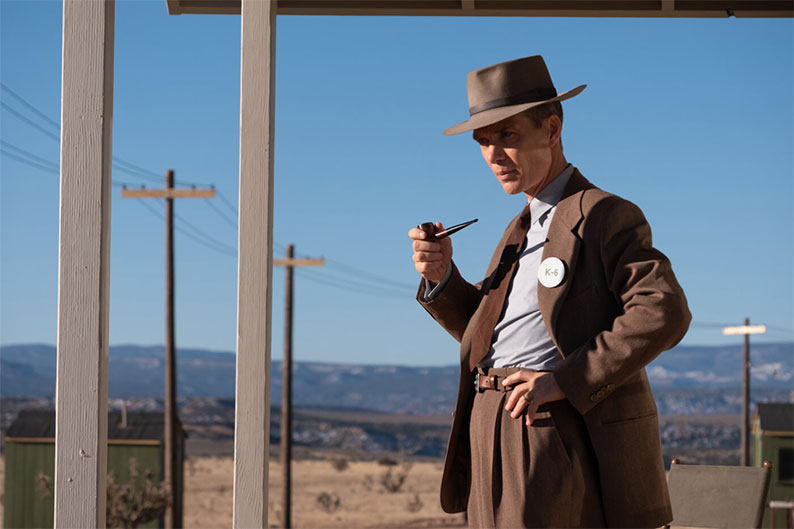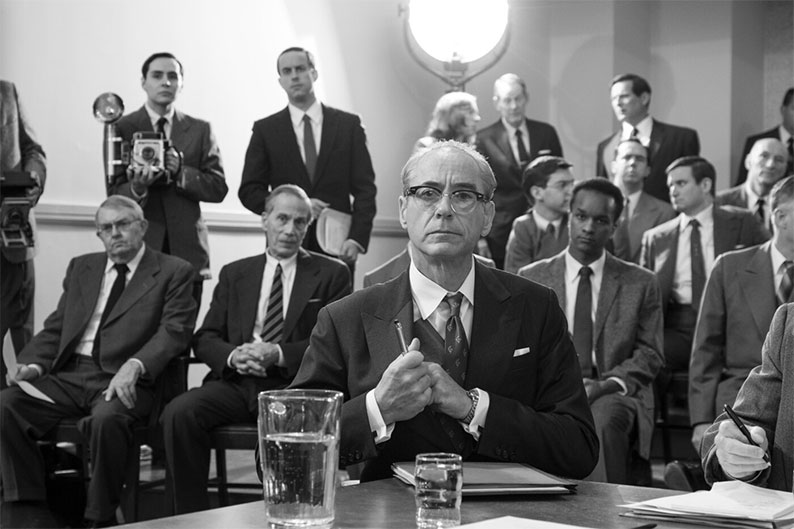| |
“The scientists at Los Alamos had determined there was a small statistical possibility that the Trinity test would ignite the atmos- phere and destroy all life on Earth… That struck me as the most dramatic situation in the history of the world, with any sort of possibility being an end to life on Earth. That’s a responsibility that nobody else in the history of the world had ever faced.” |
| |
Writer/Director Christopher Nolan* |
How’s this for a surprise (as if the potential destruction of the world wasn’t enough to get going with)? Oppenheimer shares its structural DNA with The Social Network. I have read just the one review of the film from a newspaper source and this wasn’t mentioned. I hope that the Nolan and Fincher connection isn’t so obvious that I feel I’m just parroting what everyone else thinks. They both employ a fractured timeline, multi-scene intercut style that means that we are never in one scene long enough to be weary of it. Oppenheimer’s scenes rocket by with a complex editorial style that must have taken months to hone and perfect. Sometimes, there are single shots from different scenes intercut together and yet we are never confused as to where and when we are and most importantly when we are being given visual cues, often surreal, expressionistic ones, to solve aspects of the great man’s evolving state of mind. Yes, it’s true that black and white footage is an obvious timestamp signifier, specialist IMAX stock that had to be invented just for this film. But years pass even in that timeframe. It’s a small but well-earned miracle that we are never wrongfooted. Kudos to editor Jennifer Lame, ACE but I suspect (not having read the screenplay) that this style was Nolan’s idea from the get go. I cannot begin to imagine that Nolan went out, shot his scenes and said to Jennifer, “Right, you figure it out!”, something that often happens in documentary post-production. In documentaries, the editor is as much the writer as the director. I suspect Nolan is more hands on.
The film spans time periods from 1924 to 1963 from Oppenheimer as a student in Europe to his belated recognition by his own government in the sixties. Gifted quantum physicist J. Robert Oppenheimer is subjected to an enquiry to strip him of his United States security clearance to rob him of governmental power espousing any anti-nuclear ideas he wants to express despite his own creation having ended World War II after two nuclear bombs exploded over Japan. Intercut with this timeline are many instances in Oppenheimer’s life and career that culminate with the world’s first nuclear bomb test, ‘Trinity’ and its aftermath. That is really all you need to know about the narrative. I was a little apprehensive before seeing the film knowing the story’s broad strokes but was, right from the start, heavily invested in these characters. It’s a very ‘talky’ movie but then how can it not be? But it’s a brilliant ‘talky’ movie. The character I knew nothing about was the puppet master Lewis Strauss, (curiously pronounced ‘Straws’, something explained in the film) a member of the U.S. Atomic Energy Commission who brings in Oppenheimer to teach and over the years develops a disliking of the man from jumping to erroneous conclusions. His was the story thread I most enjoyed simply by being totally unaware of it.

As you might imagine, the cast does superb work. At the centre of the film and through whose eyes the story unfolds, Cillian Murphy as Oppenheimer is staggeringly good. His gentle American accent is flawless (though I am not American so can’t be sure of this) and he inhabits this extraordinary man in a way that he acknowledges his own prodigious talents but never treats them as ways to gain political leverage. Yes, he spars with others in authority but like Sherlock Holmes, he simply is wise enough to know his own strengths. “I cannot agree with those who rank modesty among the virtues,” said Holmes. “To the logician, all things should be seen exactly as they are, and to underestimate one’s self is as much a departure from truth as to exaggerate one’s own powers.”** As Oppenheimer’s strengths are largely unfathomable to non-physicists, the film gives a lot of time to his many weaknesses. This, of course, contributes to the fascinating building of a character whose higher mind is wading through the infinity of the universe and the quantum world that obeys few natural laws. And yet, it’s the needs and desires of the corporeal body that the film doesn’t flinch from revealing. Regardless of one’s ability to imagine and interpret what others regard as unknowable or knowable only by actual geniuses, one still has a body to transport through a lifetime and that has its needs. One of those needs, the humble ‘tube of delight’ so-called by Dennis Potter (or cigarette), was what killed him from throat cancer at the age of 62 after a lifetime of chain smoking. Not a spoiler by the way.
Robert Downey Jr. as Lewis Strauss is a small but exquisite revelation. Here is the genuine $20 million a pop movie star (who took a mere $4 million together with Emily Blunt and Matt Damon reducing their normal fees), an actor who can open a tentpole blockbuster with the force of his own charismatic personality. Downey Jnr. has always housed a nascent, honest-to-goodness artist and giving this man a chance to spread hitherto hidden wings was a joy to watch. He is utterly believable as the ruthless, canny and slighted Strauss and his arc is very satisfying to follow to its conclusion. Florence Pugh plays Jean Tatlock, Oppenheimer’s lover and rising star in the American Communist Party. It’s this association and his own interest in the ideas behind communism that forever tars Oppenheimer with the Red scare brush. Jean’s vulnerability and her push-me pull-you need of a man who cannot be summoned to her side because of the immense secrecy of his work, are aspects of her character that Pugh perfectly conveys and in some surprising scenes, conveys them confidently semi-naked. Emily Blunt is just as convincing as Kitty, Oppenheimer’s wife. Their relationship is delved deeply into despite little screen time together and while providing many clues to her living an unhappy life (there’s always the hip flask in her handbag), she bears two children, the needs of whom are sometimes just too much for the wife of a man consumed by the work he was doing. During his marriage, he resumed his relationship with Tatlock so no wonder his domestic relationship was a fraught one. Oppenheimer once said to his brother “I need physics more than friends.” Thank God he had a brother. His wife, by far the stronger character in the marriage, powerlessly watches while her husband maintains a civilised friendliness even with those that did him wrong, something that drives Kitty to distraction.
The other casting choice, mentioned earlier, was Matt Damon as Brigadier General Leslie Groves. Remember this A-Lister was offered a role as a scared astronaut in Interstellar and to the man’s credit, he accepted. Not many A-Listers are happy to play cowards. Damon’s gruff military man is a delight using what intelligence he has to try and get the vastly superior intellect of Oppenheimer to do his bidding and he convinces himself correctly that Oppenheimer was vital to the project regardless of the scientist’s past affiliations. Powerful people in America in the 50s seemed to be an especially paranoid lot. The fear of the Red Menace effectively scuppered the political clout of the man who beat Hitler’s scientists to the weapon that put a firm full stop to hostilities. Imagine if the Nazis got there first… This was always Oppenheimer’s and his team’s drive – beat Hitler to the superweapon. The ramifications of what they had wrought are never too far from the surface of Murphy’s performance. The doubt and concern and vast guilt fuelled the man’s depression for the rest of his life.

The rest of the cast have, by definition, small roles but they are particularly memorable. In a character roll call of those I recognised, Josh Hartnett, Casey Affleck, Rami Malek as a key scientific witness, Kenneth Branagh as famous Danish physicist, Niels Bohr, Matthew Modine and David Dastmalchian as William L. Borden, the investigator hired to paint Oppenheimer in the darkest light. Let’s face it, he has a mien of mean! No disrespect intended but actors sometimes fit parts from their DNA alone. There’s also Tom Conti as Albert Einstein, Alden Ehrenreich (despite his Solo effort, I will always fondly remember him being directed by Ralph Fiennes to say with a clipped English accent “Would that it were so simple…” in the Coen Brothers’ Hail Caesar). Then finally there’s Jason Clarke as Roger Robb, Oppenheimer’s unofficial prosecutor, Gary Oldman as President Harry S. Truman and Ajax from The Warriors, James Remar whom I’m ashamed to say, I didn’t notice. Too much facial hair! Too little screen time. To be fair to my powers of observation, that’s a bloody big cast.
Nolan has harnessed surreal imagery depicting both the quantum realm and the might of the universe and its exploding and imploding stars. From his CG averse statements, it wouldn’t surprise me if these effective but quite simple images were obtained the same way Kubrick’s own 2001 stellar clouds and gaseous expansions were captured – with small, mundane objects and imagery carefully shot by a physical camera and captured on physical film. The accompanying sound design for these swift inserts is sometimes bone-rattlingly crunchy. We are assured that the nuclear explosion itself (hardly a spoiler) was totally captured in camera. This frenetic insert editing to heighten or create a mind space is hardly original but it retains its effectiveness nonetheless and in conjunction with the stillness of Murphy’s performance, the effect is always fascinating and revealing.
After his efforts on Tenet, composer Ludwig Göransson is back again with Oppenheimer’s scoring duties. As I have been playing it on a loop as this review was written, I have to say it is a very intense and internal score with violins to the fore playing in an often minimalist style. The sound effect nature of the score is brought about by instruments I don’t recognise, electronic very probably. The larger scale moments are very powerful though the overall score lacks a central theme, or if that’s not so, it’s a very well disguised one. It is superbly suited to the film and the character of Oppenheimer himself and deftly provides a few emotional signposts and their pay offs.
Nolan breaks with practical reality in one scene (I’m not counting the surreal swift universe/quantum/mindscape intercuts). Oppenheimer realises he is fighting against powerful people with a stacked deck, and imagines being back with communist lover Tatlock, both naked, this time in the boardroom while being interrogated with wife, Kitty sitting in ‘reality’ just feet behind him seemingly watching her husband and Tatlock have sex. It’s quite the visual shock to see that kind of vulnerability displayed as a thought made flesh, as in mid-briefing, she mounts him surrounded by men willing to take him down, an unjust ambition born of their own irrational fear. It’s very far from a Nolan image and a stylistic lurch. Perhaps for those reasons, I liked the juxtaposition a great deal.

To talk about sound on a Nolan film is often having to acknowledge that his artistic choice to deliberately make dialogue sometimes difficult to discern is bound to frustrate people. Tenet is a much better film with subtitles which really shouldn’t be the case. I watched it in the Netherlands with Dutch subtitles and my Dutch-speaking friend really enjoyed it. I missed at least sixty per cent of the English dialogue and so was at sea for most of its running time. Despite Oppenheimer’s intense mix playing effects and music at higher than normal relative levels, the dialogue skips aurally on the surface at a similar level so I was just about OK this time around.
Oppenheimer is the work of a filmmaker at the top of his game. Nolan seems to be the only mainstream director today who is making original work. That is both profoundly depressing and deeply impressive. If forced to see any negatives in the experience of seeing the movie, I will lay the blame on myself more than the film. It’s long, 180 minutes including what must be 10 minutes of end credits. Its pace is first class and under most normal circumstances, I wouldn’t feel the length but I must be getting old because for the first time I felt uncomfortable and had to change my sitting position many times. As I mentioned in my Mission Impossible review, it’s startling how good a critic one’s backside actually is. But not in this case. I was very invested in both film and characters and can only chalk up my discomfort to my ageing self. Go and see Oppenheimer so more adult, grown up movies might still get made.
As an interesting side note; there were two renowned physicists in the same wartime timeframe whose mysterious meeting in Copenhagen was a cause of great speculation. It was thought that the older Dane Neils Bohr refused to work on such a weapon for the Nazis and the other, younger German Werner Heisenberg, would (or would try hard to sabotage the project). The truth of their discussion has never been verified. But the BBC did an excellent drama, based on Michael Frayn’s play, on the meeting in 1941 simply titled Copenhagen in 2002 which I reviewed here. Bohr was welcomed into the U.S. but Heisenberg stayed on devoted to rebuilding his country after the disastrous economic and social fall out in Germany after the First World War. I’ve not deeply researched Heisenberg’s role in his atomic research but in his own Wikipedia page, it states that in June 1942, he reported to Nazi Armaments Officer Albert Speer telling him that no atomic bomb could be constructed before 1945 because of the cost and manpower needed. The bulk of Germany’s resources was tied up in the conquering of Europe at the time. We’ll never know if that was just a smokescreen to make sure the Nazis could not come first in the nuclear arms race. It’s difficult to believe that all Germans were under Hitler’s thrall. Fascinating stuff.
|